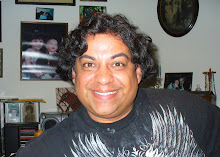I know. I know. What is a grown man doing watching New Line Cinema's 2008 production of Sex in the City, the movie based on the HBO television program, based on the book by American author and New York Observer columnist Candace Bushnell? I don't even live in New York City, which might explain part of this.
As I was watching this film, I realized that the subject matter in this picture was universal in ways I didn't expect. The topics of trusting one's intuition, forgiveness, friendship, and self-awareness all appeared in this film and were characters, at least to me, as much as Carrie, Miranda, Samantha, and Charlotte.
It got me thinking that there have been moments in every one of my relationships that were reflected in this pop culture moment. From the infidelity to the separations, from the unwelcomed notes to the reunions, the moments in the movie resonated with me. The scariest part of the movie for me was Samantha's realization that she was not living the life that she knew she had to live.
As someone who has resigned his job without anywhere else to work, left his wife to rear his children primarily on his own, and wandered 3,000 miles away from home at 16 years old because he knew it was for the best, I know how to make the tough choices and accept the consequences. Why, then, was I bothered so deeply when Samantha left Smith in Los Angeles, even though she felt so grateful to him for the time he stood by her during the chemotherapy for cancer? Why did I feel nearly guilty as Smith's pain showed so deeply in his eyes; or was that my imagination?
There is a syndrome that was first described by Walter Cannon in 1929 as the "flight-or-fight-or-freeze response," that illustrates the physiological reaction to stress and relaxation in the body (Jacobs, 2009). Simply put, when the body and mind are put in extreme stress, the desires that may fulmigate are to run, battle, or stop altogether. When the situation is dangerous, such as when someone's physical health is in jeopardy, we understand this response completely, but what happens when our emotional health is in danger? If we have this response in a challenged emotional environment, would others understand?
What if one day, an individual awakens from a terrible night's sleep and realizes that the life he or she is living is gravely deficient in areas that are important to this person. Perhaps there is no romance or adequate communication. Maybe the other person in relationship with this individual has few interests that coincide with the first person's hobbies. It could be that both the individuals, good people in their own rights, simply have little in common that would suggest they can have a happy life together.
If these things... any of these things... are true, what does one do? In the movie, Samantha left Smith. Is that the only option? No. Miranda and Steve had issues that they worked through in therapy. Carrie and Big simply had to take time to come to grips with what they both needed. Even Charlotte and Harry only had to relax to get what they wanted together, the surprise of their own birth child.
Some days, it's just a matter of sitting quietly, writing, breathing, and hoping that things will get better. Some months are like that, too.
Ultimately, it comes down to a matter of choice. How do we choose to live our lives? How much time will we spend at a lower level of happiness that we believe we deserve? What is the real balance between the days we're happy and the days we're not?
My mother always told me, "If you're happy most of the time, even 51% of the time, then stay. If you're happy 49% of the time, you should think of something else to do because no one deserves to be unhappy most of the time."
My mother was right. Everyone deserves to be peaceful and happy. Everyone deserves to sleep well.
_________________
Reference:
Jacobs, G. (2001). The physiology of mind-body interactions: the stress response and the relaxation response... papers from the Symposium on Scientific Integration of Western Medicine and Complementary, Alternative-Mind, Body Medicine, Seoul, Korea [corrected] [published erratum appears in J ALTERN COMPLEMENT MED 2002 Apr; 8(2): 219]. Journal of Alternative & Complementary Medicine, 7S83-92. Retrieved from CINAHL Plus with Full Text database.
Saturday, May 15, 2010
Love in the City
Subscribe to:
Post Comments (Atom)








Very insightful.
ReplyDelete